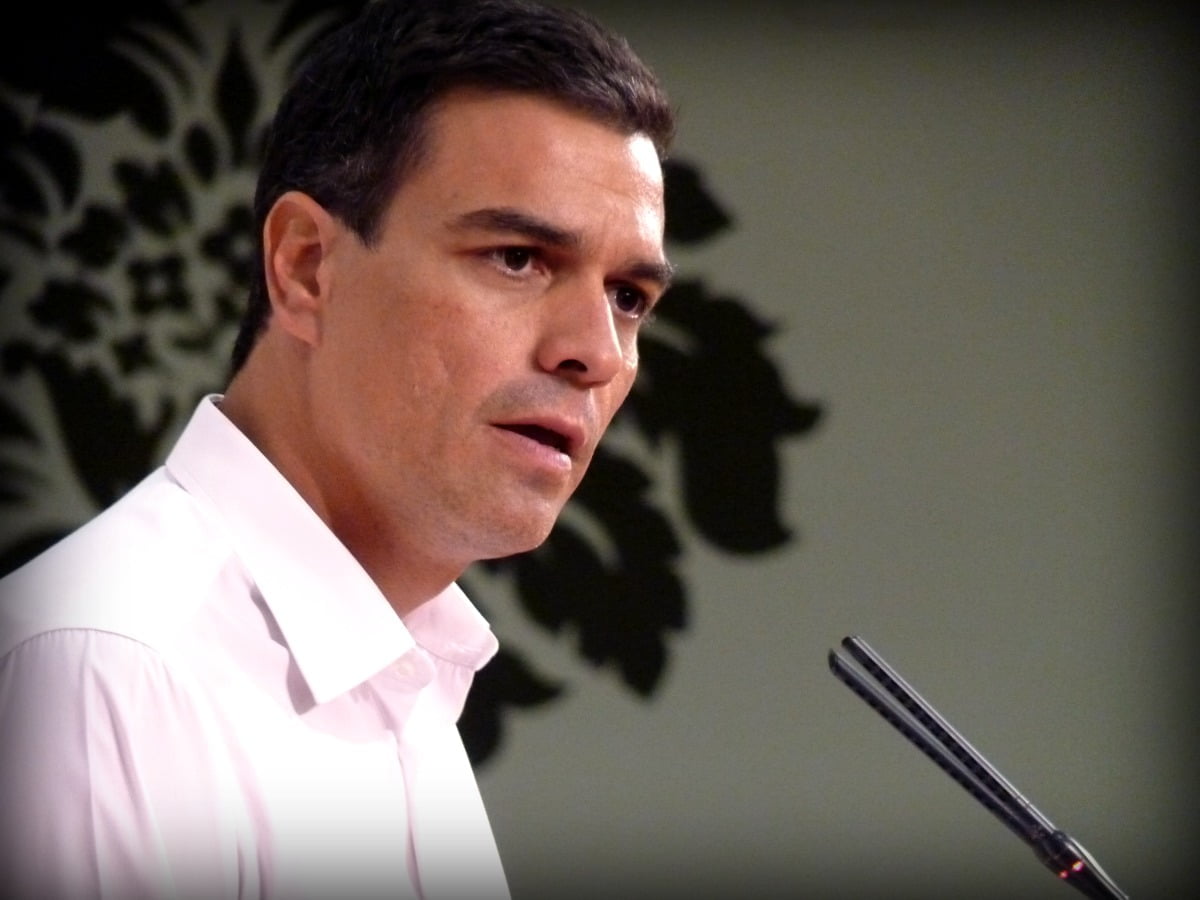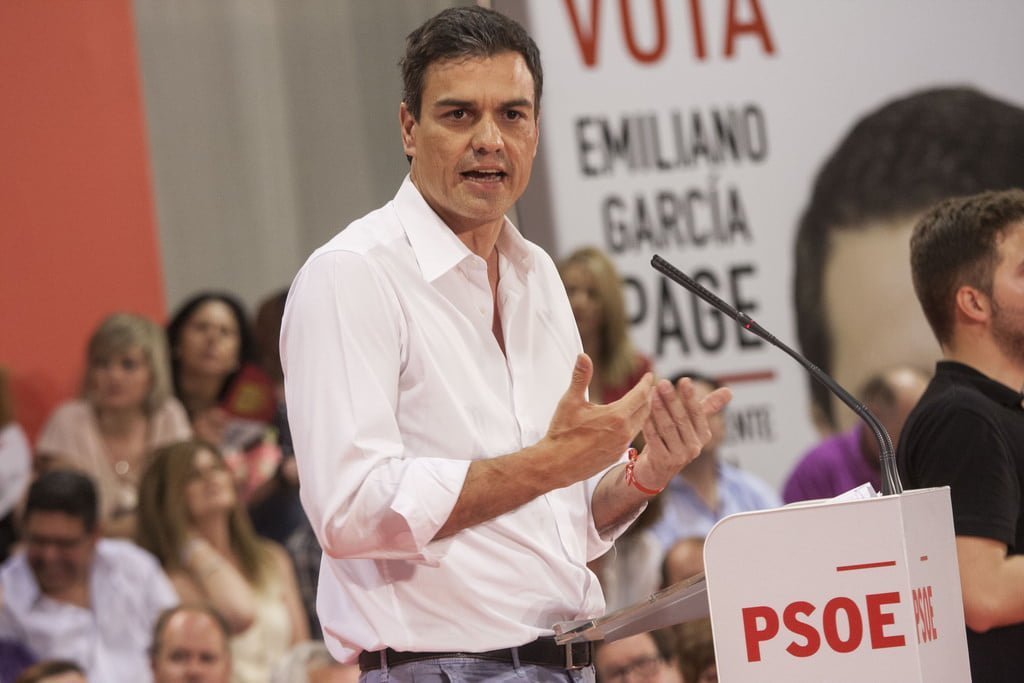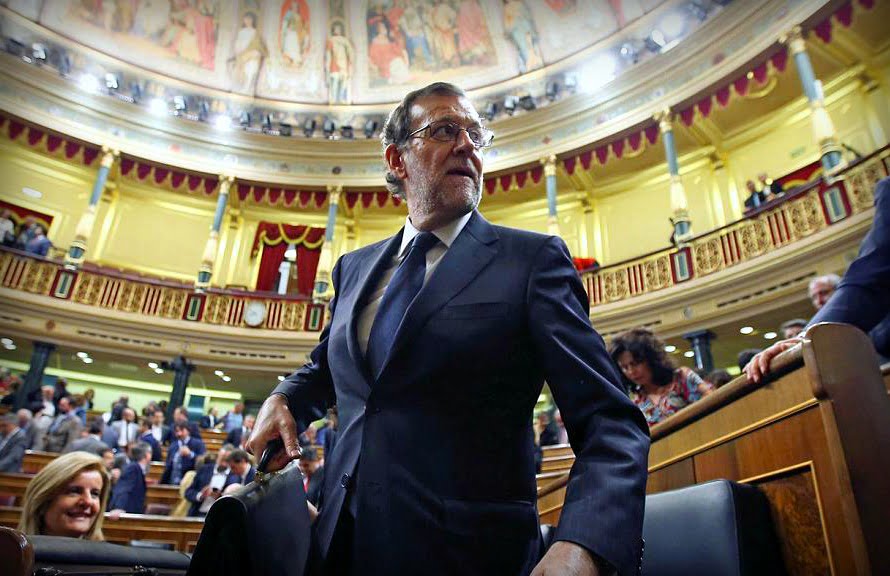The already unstable political situation in Spain has taken another dramatic turn, with right-wing Prime Minister Mariano Rajoy forced to step down after losing a vote of no confidence.
The leader of the Spanish Socialist Party (PSOE), Pedro Sanchez, has become prime minister after defeating corruption-tainted Mariano Rajoy in a parliamentary vote of no confidence. Sanchez has promised a few cosmetic changes but will keep the budget approved by Rajoy’s Popular Party (PP) and has vowed to “guarantee economic and fiscal responsibility” as well as to fulfill “European duties”.
PSOE filed the motion of no confidence after the verdict in the Gürtel corruption scandal condemned the ruling PP. The Socialist group in Parliament only has 84 members and Sanchez needed 176 votes to defeat Rajoy. He finally managed to get 180. The left-wing group Unidos Podemos (made up of Podemos, United Left and the Catalan and Galician left coalitions) had promised to support the motion from the start, adding its 67 votes. The Catalan nationalists of ERC and PDECAT also added their votes.
Sanchez still required the crucial votes of the Basque Nationalist party PNV, which the week before had provided the necessary votes for the passing of the PP-Ciudadanos budget in exchange for concessions in the form of investment. Pedro Sanchez then promised to respect the 2018 budget, which his group had opposed the week before. Once the PNV had agreed to support the motion of no confidence, Rajoy’s fate was sealed.
Sanchez forms minority government
 Even at that late stage there was still a way out for the Popular Party. If Rajoy were to resign at that point, then the no confidence motion would not have been voted on and the process of Parliament selecting a new government would have started from scratch. Yesterday afternoon the PP general secretary, Cospedal, announced that Rajoy would not resign.
Even at that late stage there was still a way out for the Popular Party. If Rajoy were to resign at that point, then the no confidence motion would not have been voted on and the process of Parliament selecting a new government would have started from scratch. Yesterday afternoon the PP general secretary, Cospedal, announced that Rajoy would not resign.
In those conditions, the motion of no confidence has automatically led to Pedro Sanchez becoming the prime minister and he will now have to form a government.
This was never the prefered option of the ruling class. Pedro Sanchez only has 84 MPs out of 350, hardly a stable majority. Any policies he wants to pass will have to be negotiated with Podemos and the Catalan or Basque nationalists on a case-by-case basis. Ciudadanos leader Albert Rivera described it as a “Frankenstein government”.
Of course the right wing was hysterical about the formation of a government with the votes of “far-left” Podemos, “those who want to break up Spain” (ERC and PDECAT) and the “terrorists’ friends” (Basque left-nationalists EH Bildu also voted against Rajoy).
A minority PSOE government will be faced with vicious opposition from the right wing, with the PP still holding an overall majority in the Senate and therefore the power to amend and veto legislation. This will be a source of instability.
What the ruling class would have wanted, once Rajoy became a spent force, was for Sanchez to move quickly to early elections, which they think can produce a more stable coalition to implement the policies they need. This was also the prefered option of extreme liberal Ciudadanos, which is currently ahead in the opinion polls. For some time now sections of the ruling class had been playing with the idea of replacing the PP with some sort of coalition involving PSOE and Ciudadanos.
Of course, it is not in the interests of Pedro Sanchez to call elections immediately, as PSOE is doing badly in the opinion polls. The next general election is scheduled for 2020, after a round of municipal and regional elections in 2019. Sanchez has said that he will form a minority PSOE government, but during the debate he also promised early elections. He will probably try to give himself sometime in office in order to improve his ratings and then call elections at a time that suits him.
Cosmetic reforms
This means that he will probably deliver some cosmetic reforms that cost no or little money, while maintaining the main planks of fiscal policy. He is already bound to keep the right-wing 2018 budget he opposed last week. Furthermore his assurances over fiscal responsibility and Europe will mean no substantial changes to a policy of cuts and austerity, only mildly alleviated by the economic growth Spain has experienced since 2014.
The ‘markets’ have already reacted positively to the imminent formation of a PSOE minority government. Goldman Sachs issued a note saying investors should not be “concerned” with the change of government. The stock exchange rebounded and rose to 2 percent higher than Thursday’s close. The cost of borrowing fell by 100 points.
In order to boost his progressive credentials Sanchez will probably repeal some of the most undemocratic aspects of the “Gag Law”, take some measures regarding gender pay gap and even throw some crumbs to the pensioners who have been in the streets for the last few months.
On the crucial issue of Catalonia’s self-determination he has said he will open “lines of dialogue” with the new Catalan president Quim Torra, but always “within the limits of the Constitution and the Catalan Autonomy Statute”. Torra’s government has already accepted the limits of what is allowed by the Spanish regime, replacing all his proposed ministers who were in jail or in exile. This, de facto, means a betrayal of the mandate of the 1 October independence referendum as well as what the mandate of the 21 December Catalan election.
Torra was elected promising to deliver a Catalan Republic but a fortnight later he has accepted the undemocratic limits of the Spanish Constitution. On this basis, any talks will just serve to ratify the fact that the Spanish regime has, for now, managed to smash the Catalan challenge.
The Unidos Podemos group in Parliament welcomed the victory in the no confidence motion with shouts of “Yes we can” and Pablo Iglesias asked Pedro Sanchez to include them in the government:
“I hope Sanchez understands that it is almost impossible to govern with 84 deputies and that Spain needs a stable, strong government that transmits guarantees to the EU that it can implement a progressive government program with a parliamentary majority of at least 156 deputies.”
This is a serious mistake. A government which “transmits guarantees to the EU” can never implement a “progressive program”.
Defeat austerity with mass struggle
Of course it was correct to vote to bring down the hated, reactionary and corrupt PP government. The end of the Rajoy administration should be celebrated. However, we cannot forget that on all major issues, it counted on the support of the PSOE. This was the case when it trampled the democratic rights of the Catalan people. It was also the case when the PP and PSOE rushed the modification of article 135 in order to enshrine fiscal austerity in the Constitution.
The degree to which concessions can be wrested from the PSOE government will depend on the combination of parliamentary pressure with mass mobilisation in the streets. The removal of Rajoy will be welcomed by the masses of working people across the country. There will be some illusions that Pedro Sanchez can introduce significant changes. This is a necessary experience.
The left should not foster any such illusions but rather organise and mobilise to demand the PSOE government implements real change in a whole number of areas of economic policy, democratic freedoms, etc. Only the entry of the masses on the scene can fundamentally change the parliamentary arithmetic.
Rajoy has been defeated. His policies can only be defeated through mass struggle.
Spain: corruption-ridden, right-wing government faces motion of no-confidence
By Jorge Martin, 30th May 2018
 On 24 May, the Spanish National Court finally ruled on the Gürtel corruption scandal. The verdict condemned the former treasurer of the ruling Popular Party (PP) and other high-ranking members for an illegal ‘kickbacks-for-contracts’ scheme, and also determined the party as a whole had benefited from corruption. The Socialist Party (PSOE) responded by filing a no-confidence motion, which will be discussed on 31 May and 1 June and could bring the government down after seven years in power.
On 24 May, the Spanish National Court finally ruled on the Gürtel corruption scandal. The verdict condemned the former treasurer of the ruling Popular Party (PP) and other high-ranking members for an illegal ‘kickbacks-for-contracts’ scheme, and also determined the party as a whole had benefited from corruption. The Socialist Party (PSOE) responded by filing a no-confidence motion, which will be discussed on 31 May and 1 June and could bring the government down after seven years in power.
The verdict on the Gürtel case was widely expected and is one of many corruption scandals affecting the PP. Still, the court ruling means that Spain is currently led by a party that has been condemned for corruption and was described by the police anti-corruption unit (UDEF) as acting as a “criminal organisation”. Over 800 high-ranking officials at all levels of the party have been indicted for corruption.
Parliamentary arithmetic
The leader of PSOE, Pedro Sanchez, filed the motion of no-confidence in parliament, which requires a majority backing (176 MPs) to bring down the Rajoy government. Sanchez came to power in the PSOE over a year ago on the basis of a promise to file a motion of no-confidence against the PP. As soon as he was elected he forgot his promise ever since he has loyally supported the PP on the repression of Catalan political rights, the issue that has dominated the parliamentary agenda.
The PP government emerged severely weakened from the 2016 election and has ruled on the basis of the support from the ‘extreme liberal’ party Ciudadanos (Cs). Last week, it could only get its budget passed by adding the votes of Basque Nationalist Party (PNV) to those of Cs. The initial impact of the motion of no-confidence was to put both the PNV and Cs in a difficult position. They had just supported the budget of a corrupt party, but it would be difficult to justify voting against the motion of no-confidence.
The PSOE coming to power through a motion of no-confidence is the last thing it needs. In order not to appear as defending a corruption-tainted government, Cs asked Rajoy to call early elections instead. If he refuses, then Cs would propose its own motion of no-confidence, but rather than form its own government, it would use it to move quickly towards early elections. This subterfuge does not even have any basis in parliamentary procedure. Rajoy cannot call early elections once the motion of no-confidence has been filed and Cs does not have enough MPs to file its own.
Perilous waters for Pedro Sanchez
 Sanchez on the other hand is navigating perilous waters. For his motion to pass he needs the vote of Podemos, which has already pledged its support. Additionally, it would have to get the support of the Catalan and Basque nationalists (ERC, PDECAT and PNV, EH Bildu). This has already been used by the PP in a hysterical campaign accusing Sanchez of “making deals with the separatists who want the break-up of Spain”.
Sanchez on the other hand is navigating perilous waters. For his motion to pass he needs the vote of Podemos, which has already pledged its support. Additionally, it would have to get the support of the Catalan and Basque nationalists (ERC, PDECAT and PNV, EH Bildu). This has already been used by the PP in a hysterical campaign accusing Sanchez of “making deals with the separatists who want the break-up of Spain”.
Still, for such an array of forces to get a majority, the votes of PNV are required. Last week, the PNV reached a deal with the PP in exchange for voting through the budget. That was already a hard pill to swallow for the PNV, because it took place at a time when the PP was blocking the formation of a new government in Catalonia by vetoing several of its members who are in jail or in exile. In exchange, the PNV received investments in the Basque Country. At this time, the PNV is not interested in early elections as its deal with the PP might damage it in the polls. It has demanded from the PSOE that it should govern on the basis of the existing PP budget.
Meanwhile, the Catalan nationalists of ERC and PDECAT seem inclined to vote for the PSOE motion of no-confidence with the aim of getting rid of the PP. The PNV has indicated that it will vote for the motion but only if the Catalans do. The left-wing Basque independence party EH Bildu has already said that while “Sanchez is not part of the solution” they would under no circumstances prop up a PP government.
Unidos Podemos (the coalition between Podemos and IU) has said it will support the motion and has offered to back a PSOE government with a “social agenda”. Furthermore, Pablo Iglesias has indicated that if the motion from PSOE were to fail, he would present his own, with a “neutral” candidate. in order to then move towards calling early elections (something even Cs would find difficult to reject).
In the next two days we will see all sorts of negotiations and horse trading behind the scenes. The PP will try to stay in power at all costs, as in early elections it would be severely hit. There is even talk of Rajoy stepping down in favour of his deputy, thus throwing a spanner in the works of PSOE’s no-confidence motion. However, it is highly unlikely this government will survive. The PSOE will try to please everyone, offering to let the PNV keep the deal they got from the budget, try to put Cs in an impossible situation, etc. The PNV will try to put a price to its vote. In this context of parliamentary quid pro quo, Unidos Podemos has very little chance of gaining any real concessions from the PSOE. What the ruling class wants is the least amount of disruption to the normal functioning of a government willing to implements its programme. So far the PP has played this role, but once it is clear that it has become a spent force the ruling class will have no qualms about using a replacement, be that in the form of the Cs or PSOE, or a combination of both.
No illusions in PSOE
The coming to power of a PSOE government, whether as an interim arrangement leading to early elections or a longer set up exhausting the current parliament (2020), in itself would not mean a fundamental change in policies. The PSOE leadership is part of the 1978 regime and has shown it in all crucial junctures in the last 40 years. In the recent past it agreed with the PP’s reform of the constitution, enshrining fiscal austerity in article 135 (as the troika requested) and has fully backed the assault on Catalan democratic rights.
A PSOE government could come to power through this motion of no-confidence with the backing of the left and Catalan and Basque nationalists, only to implement right-wing policies with the backing of PP and Cs on a case by case basis.
The likely removal of the PP from office however, will lift a heavy weight on the minds of millions of working people in Spain. The idea that this right-wing, corrupt party had carried out a policy of cuts for so many years and been involved in so many scandals and yet remained in power had the effect of breeding pessimism.
A PSOE government would immediately be under pressure to make concessions on several fronts, first of all to the pensioners movement, which has taken the streets in recent months. For this reason, a mass mobilisation would be required outside parliament. Rather than allowing everything to be decided behind closed doors, Podemos and United Left should be calling mass demonstrations outside the building, so that the removal of the PP is won not only by parliamentary arithmetic but also by the pressure of the masses.
Kick out the PP, in parliament and the streets!
As the Spanish comrades of Lucha de Clases have said:
“We must kick this government out, in parliament and in the streets.”
All conditions exist for such a movement. There is growing discontent over a growing assault on democratic rights and freedom of expression. We have witnessed the movement of the pensioners and the huge mobilisation of women in the 8 March feminist strike and against the reactionary male chauvinist justice system. The first months of 2018 have been marked by the beginning of a recovery of the mass protest movement, after a period in which all attention had concentrated on the electoral plane. Unfortunately the leaders of Podemos and United Left have not been up to the task of providing all these separate movements with a common channel of expression.






